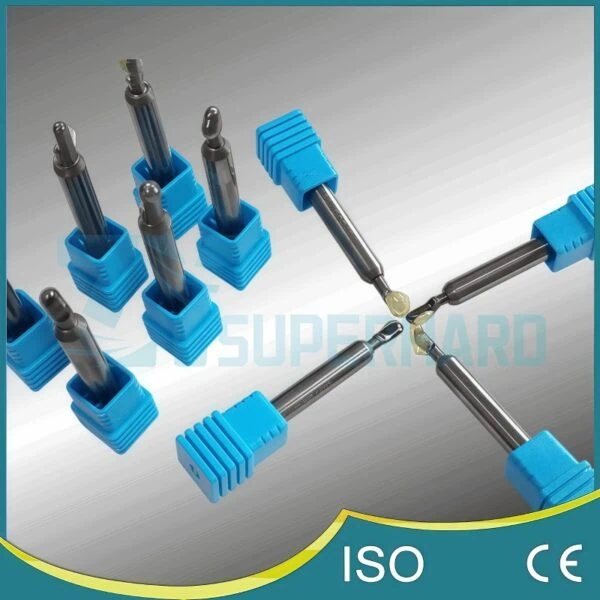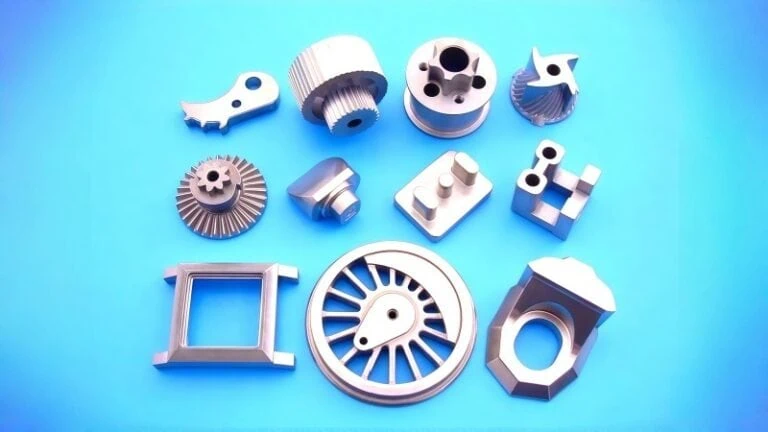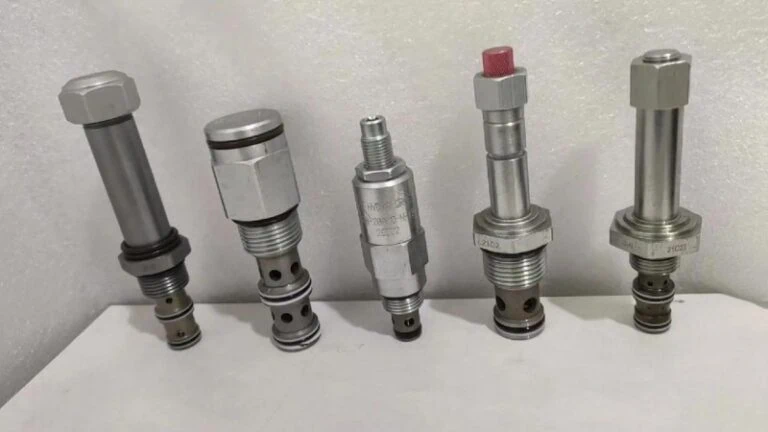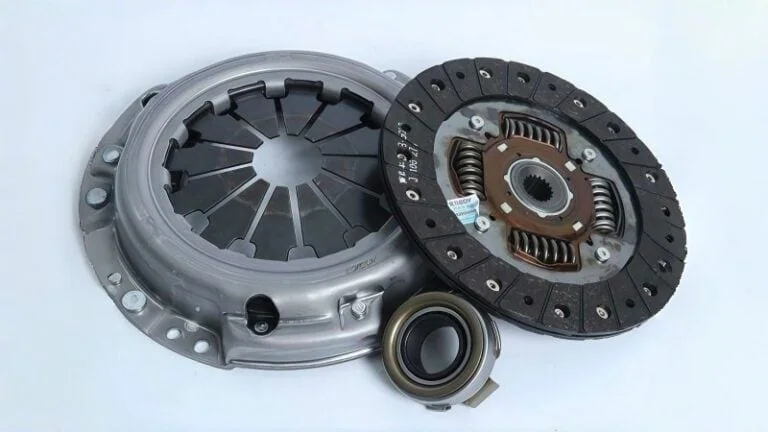-
Whatsapp: +86 13526572721
-
Email: info@zydiamondtools.com
-
Address: AUX Industrial Park, Zhengzhou City, Henan Province, China
-
Whatsapp: +86 13526572721
-
Email: info@zydiamondtools.com
-
Address: AUX Industrial Park, Zhengzhou City, Henan Province, China

What Are the Main Types of PCD Cutting Tools and How Do You Choose the Right One?
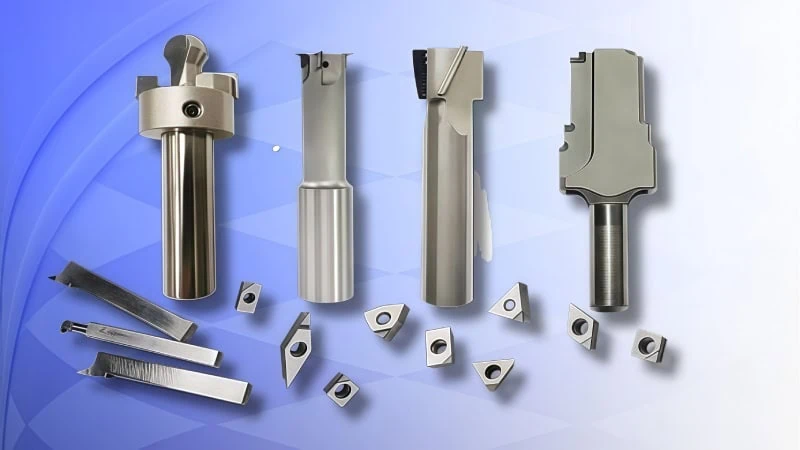
What exactly are the main types of PCD cutting tools, and how do you figure out which one is right for your needs?
PCD (Polycrystalline Diamond) cutting tools1 vary widely by geometry (like inserts, drills, end mills) and construction (tipped vs. solid), excelling in machining non-ferrous metals, composites, and wood products due to superior wear resistance and speed capabilities compared to carbide; selecting the correct tool involves matching the PCD grade, geometry, and edge prep to the specific material, machine stability, and balancing performance requirements with budget.
How Are PCD Tools Generally Categorized?
So, how do experts sort and understand the different kinds of PCD cutting tools available?
PCD (Polycrystalline Diamond) cutting tools are primarily categorized in two main ways: first, by their shape and the job they do (tool geometry and function), and second, by how the diamond cutting edge is built into the tool body (construction method, mainly tipped/brazed versus solid/vein designs).
Classification by Tool Geometry and Function
Think of PCD tools like specialized tools in a toolbox – each shape is designed for a specific kind of cutting job. Therefore, one major way to group them is by looking at their physical shape and understanding what task that shape performs best.
Cutting Inserts2
These are typically small, indexable (replaceable) pieces of PCD, often square, triangular, or diamond-shaped.
- Function: Primarily used in turning (like shaping a part on a lathe) or milling (like flattening surfaces or cutting slots with a rotating cutter head). They act as the removable cutting tip held in a larger toolholder.
- Example: You’ll find PCD inserts widely used in automotive manufacturing for high-speed finishing of aluminum engine blocks or transmission casings, where consistency and speed are crucial.

Round Tools
This category includes tools that are generally cylindrical and rotate to cut.
- PCD Drills: As the name suggests, these create holes. PCD drills excel in producing very precise holes, especially in abrasive materials. They come in various designs, like twist drills or specialized ‘dagger’ drills.
- PCD End Mills: These look a bit like drill bits but are designed for cutting slots, steps, pockets, and shaping profiles on workpiece edges. Imagine using them to precisely carve out shapes.
- PCD Reamers: After a hole is drilled, a reamer is used to slightly enlarge it to a very exact size and make the inside surface very smooth. PCD reamers ensure high precision and long life in this finishing operation.
Saws and Other Specialized Forms
Beyond inserts and round tools, PCD is formed into other shapes for specific tasks.
- PCD Saw Blades: Used for cutting materials, particularly in woodworking for engineered woods like MDF or particleboard, and increasingly in cutting composite panels.
- PCD Grooving or Forming Tools3: These are custom-designed tools made to cut specific profiles or grooves in a single pass, increasing efficiency for unique part features.
Understanding the tool’s geometry gives you the first clue about its intended purpose in a machining process.
Classification by Construction Method (Solid vs. Tipped/Brazed)
Besides shape, how the hard PCD cutting edge is actually attached to or integrated with the main body of the tool is another critical way to classify them. This construction impacts the tool’s performance, cost, and potential applications.
Tipped or Brazed PCD Tools
This is a very common construction method.
- Description: In this design, a relatively small segment or tip of PCD material is joined (usually by brazing, a type of high-temperature soldering) onto a body made of a tougher but less wear-resistant material, typically tungsten carbide4 or sometimes steel.
- Analogy: Think of it like adding a sharp, durable diamond tip onto a sturdy handle.
- Characteristics: This method is often cost-effective, especially for larger tools or inserts where using solid PCD would be very expensive. It allows for straightforward replacement of worn cutting edges in some tool designs. The quality of the braze joint is critical to the tool’s performance.
Solid or Vein PCD Tools
This represents a more integrated approach.
- Description: Instead of just a small tip, a larger mass of PCD is used. This can range from tools where the entire cutting head is nearly solid PCD, to designs where a thick “vein” of PCD is sintered5 directly within a slot in a carbide body during manufacturing.
- Analogy: Imagine making a larger portion of the cutting end, or even the whole cutting structure, out of the strong PCD material itself, rather than just adding a tip.
- Characteristics: These designs can offer higher rigidity, better heat dissipation, and allow for more complex cutting geometries or smaller tool diameters compared to some brazed designs. They are often favored for high-performance applications or micro-machining. However, they can have a higher initial purchase price. The specific “vein” thickness or integration method can significantly influence performance, and it’s wise to consult manufacturer specifications for details on their particular solid PCD construction, as designs vary.
Here’s a simple comparison:
| Feature | Tipped / Brazed PCD | Solid / Vein PCD |
|---|---|---|
| PCD Usage | Smaller segment attached to body | Larger PCD mass integrated into body/tip |
| Cost | Often lower initial cost, especially for larger tools | Often higher initial cost |
| Rigidity | Generally good, depends on body & braze quality | Can offer higher rigidity, especially in smaller tools |
| Geometry | Suitable for many standard geometries | Allows for potentially more complex or smaller geometries |
| Common Use | Inserts, larger tools, some standard round tools | High-performance round tools, micro-tools, complex forms |
Understanding both the geometry/function and the construction method helps provide a clearer picture of a specific PCD tool’s capabilities and where it fits within the vast range of cutting solutions.
Which Materials and Machining Tasks Benefit Most from PCD Tools?
Given their unique properties, where do PCD cutting tools truly make the biggest difference?
PCD cutting tools deliver exceptional performance primarily when machining non-ferrous metals6 (like aluminum and copper alloys), highly abrasive composite materials (such as carbon and glass fiber reinforced polymers), wood products (especially engineered woods), certain plastics, and other tough non-metallic materials; they are particularly effective in high-performance finishing, drilling, and milling operations on these materials.
Excelling in Non-Ferrous Metal Machining (Al Alloys, Copper, etc.)
PCD tools are a top choice for materials that don’t contain iron, known as non-ferrous metals.
- What are they? This group includes common metals like aluminum (Al) and its alloys (especially those with high silicon content, which are very abrasive), copper (Cu), brass, bronze, magnesium, and even precious metals like gold and platinum.
- Why PCD works well: Diamond has very low chemical reactivity with these metals, meaning the tool doesn’t tend to chemically bond with the material being cut, which helps prevent built-up edge (material sticking to the tool). Furthermore, PCD’s extreme hardness resists the abrasive wear caused by elements like silicon often found in aluminum alloys.
- Industry Examples: The automotive industry relies heavily on PCD for machining aluminum engine blocks, cylinder heads, pistons, wheels, and transmission parts. Similarly, the aerospace industry uses PCD for aluminum structural components. High-speed finishing of these parts to tight tolerances is a key application.
Mastering Abrasive Composites (CFRP, GFRP, MMC)
Composite materials, which combine different substances like strong fibers within a plastic or metal matrix, are notoriously difficult to machine.
- What are they? Common examples include Carbon Fiber Reinforced Polymers (CFRP), Glass Fiber Reinforced Polymers (GFRP), and Metal Matrix Composites (MMC). These are lightweight yet strong materials.
- Why PCD is needed: The reinforcing fibers (carbon, glass) are extremely abrasive and act like tiny files, rapidly dulling conventional cutting tools like carbide. PCD’s exceptional hardness allows it to cut these fibers effectively for much longer periods. This helps prevent issues common with worn tools, such as delamination7 (layers separating) or fiber pull-out, leading to better quality parts.
- Industry Examples: Aerospace manufacturing uses PCD extensively for trimming, drilling, and routing composite aircraft body panels, wing components, and interior structures. The wind energy sector uses PCD for machining large composite turbine blades. High-performance automotive and sporting goods industries also rely on PCD for their composite parts.
Effective Solutions for Wood, Laminates, and Plastics
While perhaps less glamorous than aerospace composites, PCD finds widespread use in these common materials.
- Why PCD works well: Many engineered wood products like Medium-Density Fiberboard (MDF)8, particleboard, and laminate flooring contain highly abrasive binders and fillers. PCD provides the necessary wear resistance for long tool life in high-volume production. Similarly, some plastics, especially those with abrasive fillers (like glass fibers), benefit from PCD’s durability.
- Industry Examples: The furniture industry uses PCD-tipped saw blades, routers, and drills for mass production, achieving consistent quality and reducing downtime compared to frequent carbide tool changes. Likewise, flooring manufacturers employ PCD for cutting and shaping abrasive laminate materials.
Applications in Other Tough Materials (Green Ceramics, Carbide)
PCD also tackles some other challenging, often abrasive non-metallic materials.
- Green Ceramics: This refers to ceramic parts before they are fired (sintered) into their final hard state. In this “green” state, they can be very abrasive, and PCD is used for shaping them.
- Tungsten Carbide: While very hard itself, PCD can sometimes be used to machine pre-sintered tungsten carbide parts or even some fully sintered grades in specific finishing applications, although this is highly specialized.
- Graphite: Used for electrodes in EDM (Electrical Discharge Machining) and other applications, graphite can be abrasive and dusty to machine; PCD offers good performance here too.
Common High-Performance Operations (Finishing, Drilling, Milling)
Beyond the materials themselves, PCD tools are often chosen for specific types of machining operations where high performance is key, particularly on the suitable materials listed above.
- High-Speed Finishing: PCD allows for very high cutting speeds (surface feet per minute or meters per minute) when finishing non-ferrous metals and composites. This results in excellent surface quality and significantly reduced cycle times. Think of getting a very smooth, precise surface incredibly quickly.
- Precision Drilling: Creating accurate holes, especially in abrasive composites without causing damage like delamination, is a strength of properly designed PCD drills. They maintain their sharp cutting edges longer, ensuring hole quality over many cycles.
- Efficient Milling: Whether shaping edges, cutting slots, or surfacing parts, PCD milling cutters enable faster material removal rates and maintain accuracy for extended periods when working with appropriate materials like aluminum or composites.
It’s crucial to remember that optimal cutting parameters, such as speed and feed rates, vary significantly depending on the specific PCD tool grade, geometry, the exact material being machined, the machine’s condition, and other factors. Therefore, always consult the tool supplier’s recommendations for starting parameters and adjust based on the specific application.

Why Choose PCD Over Carbide9 or Other Advanced Tool Materials?
With options like standard carbide readily available, what makes PCD cutting tools the right choice in certain situations?
Choosing PCD tools over conventional materials like tungsten carbide is often justified by their significantly longer tool life due to extreme wear resistance, the ability to machine at much higher speeds and feeds, the superior surface finish and dimensional accuracy they achieve, and their excellent long-term cost-effectiveness in high-volume or difficult-to-machine applications, though it’s crucial to distinguish their best uses from those of other advanced materials like CBN.
Unmatched Tool Life and Superior Wear Resistance
One of the most compelling reasons to use PCD is its incredible lifespan compared to other tool materials, especially tungsten carbide.
- The Science: Diamond is the hardest known material. PCD harnesses this, creating an edge highly resistant to abrasive wear10 – the process of being gradually ground down by the material being cut. This is particularly vital when machining abrasive materials like high-silicon aluminum or composites.
- The Result: PCD tools can last dramatically longer than carbide tools in the right applications. It’s not uncommon to see tool life increases of 10x, 50x, or even over 100x in optimized scenarios, for instance, when machining certain abrasive wood composites or aluminum alloys.
- The Impact: This translates directly to less downtime for tool changes, more consistent production, and fewer tool purchases over time. Imagine a production line running for days or weeks without needing a tool change, versus changing carbide tools multiple times per shift. However, it is important to note that actual tool life gains heavily depend on the specific material, machine conditions, and cutting parameters used, so these multiples serve as examples of potential rather than guarantees.
Enabling Higher Cutting Speeds and Feed Rates
PCD’s properties allow machine tools to run significantly faster.
- How it Works: Because PCD resists wear and manages heat well in its suitable applications, you can increase both the cutting speed (how fast the tool moves past the material, often measured in SFM or m/min) and the feed rate (how quickly the tool advances into the material).
- The Benefit: This directly leads to shorter cycle times – the time it takes to produce one part. Faster cycle times mean higher productivity and throughput for the manufacturing operation. For example, finishing an aluminum automotive wheel might take significantly less time with PCD tooling compared to carbide, allowing more parts to be made in the same amount of time. As with tool life, the achievable increase in speeds and feeds varies greatly with the application, and manufacturer guidelines should be consulted.
Achieving Better Surface Finishes and Dimensional Accuracy
A tool that stays sharp longer cuts more cleanly.
- Edge Retention: PCD holds its sharp cutting edge much longer than carbide under abrasive conditions. A sharp, consistent edge produces a cleaner shear of the material being cut.
- Surface Quality: This results in smoother surface finishes on the workpiece, often measured by a lower Ra (Roughness average) value. In some cases, using PCD can achieve finishes fine enough to eliminate the need for later polishing or grinding steps. For instance, machining aluminum with PCD can yield mirror-like finishes.
- Accuracy: A tool that doesn’t wear quickly also maintains its size and shape better. This leads to improved dimensional accuracy and consistency from part to part, ensuring components meet strict engineering tolerances. This is critical for precision parts used in engines or aerospace assemblies.
Understanding the PCD vs. CBN Application Differences11
PCD is an advanced material, but it’s not the answer for everything. It’s vital to distinguish it from another key superabrasive: CBN (Cubic Boron Nitride)12.
- The Key Difference: Iron: Diamond (PCD) tends to react chemically with iron (Fe) at the high temperatures generated during cutting ferrous metals (like steel and cast iron). This causes rapid tool wear. CBN, while also extremely hard, does not have this affinity for iron.
- Rule of Thumb:
- Choose PCD for: Non-ferrous metals (Al, Cu), composites, wood, plastics, other non-metals.
- Choose CBN for: Hard ferrous metals (hardened steels > 45 HRC, cast irons, powdered metals, superalloys).
Here’s a quick comparison table:
| Feature | PCD (Polycrystalline Diamond) | CBN (Cubic Boron Nitride) |
|---|---|---|
| Primary Strength | Extreme Hardness, Abrasion Resistance | High Hardness, High Temperature Stability, Low Fe Reactivity |
| Best Materials | Aluminum Alloys, Copper, Composites, Wood, Plastics | Hardened Steels, Cast Irons, Superalloys, Sintered Metals |
| Avoid With | Ferrous Metals (Steels, Irons) at high speeds | Soft Steels, Aluminum, Non-Metals (Generally) |
Using the wrong superabrasive material for the job can lead to very poor tool life and performance.
Evaluating Long-Term Cost-Effectiveness
PCD tools typically have a higher initial purchase price than carbide tools. So, why invest?
- Total Cost of Ownership: The decision often comes down to the total cost per part produced rather than just the initial tool cost. While the upfront investment is higher, PCD can significantly lower the overall cost through several factors:
- Drastically Reduced Tool Consumption: Buying far fewer tools over time.
- Minimized Machine Downtime: Less time spent stopping machines to change worn tools.
- Increased Productivity: Making more parts per hour due to higher speeds and feeds.
- Improved Part Quality: Reducing scrap rates and potentially eliminating secondary finishing operations.
- The Calculation: For high-volume production runs (like in automotive) or when machining very difficult, abrasive materials (like aerospace composites), the savings from these factors can quickly outweigh the higher initial tool price, making PCD the more economical choice in the long run. It’s an investment in efficiency and consistency for the right applications.

What Key Factors Determine the Right PCD Tool Selection?
Knowing the types and benefits is great, but how do you actually pick the specific PCD tool that will work best for your job?
Selecting the right PCD cutting tool involves carefully considering several interconnected factors: matching the PCD grade (diamond particle size) to the job’s demands, choosing the optimal tool geometry and edge preparation, analyzing the specific characteristics of the workpiece material, ensuring your machine tool is capable and stable enough, and finally, balancing the required performance with budget constraints.
Matching PCD Grade (Particle Size) to Application Requirements
PCD isn’t just one material; it comes in different “grades,” mainly based on the size of the diamond crystals sintered together. Think of it like sandpaper – different grits for different jobs. The particle size significantly affects the tool’s properties:
- Fine / Micrograin Grades (Smallest Particles):
- Characteristics: Creates the sharpest edges, leading to the best possible surface finishes. However, these fine edges can be less resistant to chipping or impact (lower toughness).
- Best Uses: Finishing operations requiring mirror-like surfaces (low Ra), machining less abrasive materials, applications where edge sharpness is paramount.
- Medium Grades (Mid-range Particles):
- Characteristics: Offer a good balance between wear resistance (hardness) and edge strength (toughness). This makes them versatile.
- Best Uses: General-purpose machining in many suitable PCD materials, handling both finishing and some light roughing. Often a good starting point.
- Coarse Grades (Largest Particles):
- Characteristics: Provides the highest resistance to abrasive wear because the larger diamond crystals wear down more slowly. However, the edge may not be as sharp initially, potentially leading to slightly rougher finishes, and can be more prone to micro-chipping under impact.
- Best Uses: Rough machining (removing lots of material quickly), cutting highly abrasive materials (like high-silicon aluminum or very abrasive composites), applications where maximum tool life in abrasive conditions is the main goal.
Here’s a simplified overview:
| PCD Grade (Particle Size) | Wear Resistance | Edge Toughness / Chip Resistance | Typical Surface Finish | Primary Use Case |
|---|---|---|---|---|
| Fine / Micrograin | Good | Lower | Best | High Precision Finishing |
| Medium Grain | Very Good | Good | Good | General Purpose / Versatile |
| Coarse Grain | Excellent | Fair | Fair / Good | Roughing / Highly Abrasive |
Crucially, PCD grade designations and their exact properties can vary significantly between tool manufacturers. Always refer to the supplier’s specific grade information and recommendations when making a selection.
Selecting the Optimal Tool Geometry and Edge Preparation
Beyond the PCD grade itself, the shape of the tool and how the cutting edge is prepared are critical.
- Tool Geometry: As discussed earlier, the basic shape (drill, end mill, insert) defines the function. But optimizing specific angles like rake (controls chip flow), clearance (prevents rubbing), and helix (on round tools, affects chip removal) is key for performance in a specific material and operation. Incorrect geometry can lead to poor chip control, rubbing, or premature wear.
- Edge Preparation: A perfectly sharp diamond edge can be fragile. Edge preparation involves slightly modifying the edge to increase its strength and prevent tiny fractures (micro-chipping), especially under stress (like interrupted cuts or harder materials). Common preps include:
- Hone: A very small rounding of the cutting edge.
- Chamfer (or K-Land): A small flat angle ground onto the edge.
- T-Land (Negative Land): Similar to a chamfer but often wider or at a negative angle.
The type and size of edge prep needed depend heavily on the PCD grade, the material being cut, and whether the cut is continuous or interrupted. Selecting the correct geometry and edge prep is often best done in consultation with the tool supplier, as recommendations are highly application-specific.
Considering Workpiece Material Characteristics
You need to look deeper than just the basic material type (e.g., “aluminum”).
- Specific Alloy/Grade: Is it a standard aluminum alloy or a high-silicon automotive grade (much more abrasive)? Different grades within the same material family can machine very differently.
- Abrasiveness Level: How abrasive are the fillers in that specific composite or engineered wood? This directly influences the PCD grade selection (coarser for more abrasive).
- Chip Formation: Does the material produce long, stringy chips or small, broken chips? This affects the optimal tool geometry (e.g., chip breaker features, flute design on end mills).
- Hardness/Ductility: These properties influence cutting forces and how the material interacts with the tool edge.
Understanding these specific details helps tailor the PCD tool choice for optimal performance and life.
Aligning with Machine Tool Capabilities and Stability
Using an advanced tool like PCD requires a capable machine.
- Speed Capability: Can the machine spindle reliably achieve and maintain the high speeds where PCD often excels?
- Rigidity and Stability: This is paramount. PCD tools perform best in smooth, vibration-free conditions. A machine tool that lacks stiffness (allowing movement or “chatter” during the cut) will likely cause the PCD edge to chip prematurely, drastically reducing tool life and ruining surface finish. A rigid machine, good spindle condition, and secure work holding are essential to realize PCD’s full potential.
- Coolant Delivery: Effective coolant application (if used) is important for managing heat and flushing chips, especially at high speeds. The machine must have an adequate coolant system.
Trying to use high-performance PCD on an old, worn, or lightweight machine might lead to disappointing results and wasted investment.
Balancing Performance Needs with Budget Constraints
Finally, selecting a PCD tool involves a practical balance.
- Performance vs. Cost: While a highly specialized PCD tool with an advanced grade and complex geometry might offer the absolute peak performance, it will also likely come with a higher price tag. Is that peak performance necessary for the application, or would a more standard, cost-effective PCD option provide sufficient results?
- Total Cost Thinking: Revisit the idea of Total Cost of Ownership. Evaluate the potential savings from increased tool life, reduced downtime, and faster cycle times against the initial tool cost. For high-volume production or machining extremely difficult materials, the higher upfront cost of an optimized PCD tool often provides the best overall value. For lower volumes or less demanding jobs, a more standard PCD tool might be the smarter financial choice.
- Application Requirements: What are the critical requirements? Is it maximum speed? Absolute best surface finish? Longest possible tool life between changes? Or simply a reliable improvement over carbide? Defining the priorities helps guide the selection and budget decisions.
Choosing the right PCD tool is a process of matching the tool’s characteristics (grade, geometry, construction) to the specific demands of the material, operation, and machine, all while considering the economic realities of the production environment.
Conclusion
In summary, PCD cutting tools offer significant advantages in specific applications due to their unique properties derived from polycrystalline diamond. By understanding how these tools are categorized by geometry and construction, identifying the materials and operations where they truly excel (primarily non-ferrous metals and abrasive non-metals), appreciating the key benefits over materials like carbide (tool life, speed, finish), and carefully considering the crucial selection factors (grade, geometry, material specifics, machine stability, budget), users can make informed decisions. Choosing the right PCD tool tailored to the specific application is essential for maximizing productivity, ensuring part quality, and achieving long-term cost-effectiveness in demanding manufacturing environments.
References
- PCD (Polycrystalline Diamond) cutting tools1 – Explore the comprehensive range of standard and custom PCD & PCBN tools from ZYDiamondTools.
- Cutting Inserts2 – ZYDiamondTools product page for standard and custom PCD cutting inserts.
- Forming Tools3 – ZYDiamondTools product page for custom PCD forming tools designed for aluminum alloys.
- tungsten carbide4 – Wikipedia page detailing the properties and applications of tungsten carbide.
- sintered5 – ScienceDirect topic page explaining the sintering process in materials science and engineering.
- non-ferrous metals6 – Wikipedia article defining and listing examples of non-ferrous metals.
- delamination7 – ScienceDirect topic page explaining the concept of delamination in materials, particularly composites.
- Medium-Density Fiberboard (MDF)8 – Wikipedia article describing MDF, its production, and properties.
- Why Choose PCD Over Carbide9 – ZYDiamondTools blog post comparing PCD and Carbide cutting tools.
- abrasive wear10 – ScienceDirect topic page explaining the mechanisms and characteristics of abrasive wear.
- Understanding the PCD vs. CBN Application Differences11 – ZYDiamondTools blog post explaining the key differences and applications of PCD and CBN tools.
- CBN (Cubic Boron Nitride)12 – ZYDiamondTools comprehensive guide covering CBN cutting tools, their properties, and usage.


